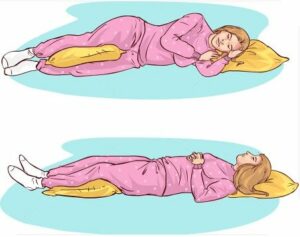Knee pain is a common complaint among individuals of all ages. While many experience it during physical activities, some people notice knee pain even while they’re resting or sleeping. This type of pain can disrupt your sleep cycle and, consequently, your overall well-being. This article delves into the causes, remedies, and prevention of knee pain while sleeping.
Contents
Why Do My Knees Hurt While Sleeping?
 If your knees hurt while sleeping, it can be due to a variety of reasons. Understanding these can help you find a solution to get a better night’s sleep. Here are some common reasons why your knees might hurt while sleeping:
If your knees hurt while sleeping, it can be due to a variety of reasons. Understanding these can help you find a solution to get a better night’s sleep. Here are some common reasons why your knees might hurt while sleeping:
- Osteoarthritis
As one of the most common forms of arthritis, osteoarthritis occurs when the protective cartilage that cushions the ends of your bones wears down over time. The knee is a common joint affected by this. Discomfort can intensify during the night.
- Rheumatoid Arthritis
This is an autoimmune disease where the immune system attacks the joints. Pain from RA can be severe and often affects both knees.
- Tendinitis
This is inflammation or irritation of a tendon, which can cause pain in or around the knee, especially when the leg has been in one position for a prolonged period.
- Bursitis
Inflammation of the bursae, the small sacs filled with fluid that cushion the outside of your knee joint, can result in knee pain.
- Gout
This is a form of inflammatory arthritis that can cause intense pain, usually starting in the big toe but also affecting the knees.
- Chondromalacia Patellae
Also known as “runner’s knee”, this refers to the breakdown of cartilage under the kneecap.
- Ligament or Meniscus Injuries
Sprains, strains, or tears can result in lingering pain, which may be felt more acutely during the night or when the knee is at rest.
- Sleeping Position
If you’re sleeping in a position that puts strain or pressure on your knees, it could result in pain. For example, if you’re a side sleeper and your knees are touching, it can create uncomfortable pressure.
- Previous Surgery or Injury
If you’ve had surgery on your knee or suffered an injury in the past, residual pain or discomfort can occasionally flare up.
For temporary relief, consider changing your sleeping position, using pillows to support or elevate the legs, or applying cold or hot packs.
How Do I Know If My Knee Pain Is Serious?
 Knee pain can vary from a minor annoyance to a debilitating condition. It’s essential to recognize when knee pain is serious and requires medical attention. Here are some indicators that your knee pain may be severe:
Knee pain can vary from a minor annoyance to a debilitating condition. It’s essential to recognize when knee pain is serious and requires medical attention. Here are some indicators that your knee pain may be severe:
- Swelling: Mild swelling can occur after exercise. But if your knee swells suddenly or the swelling doesn’t subside after a few days, it could indicate a more serious problem like a ligament tear or fracture.
- Intensity and Duration: Persistent or excruciating pain, especially if it lasts more than a few days or is recurrent, should be evaluated by a medical professional.
- Deformity: If your knee looks deformed or out of place (not aligned as it should be), it can indicate a significant injury such as a dislocation or fracture.
- Limited Range of Motion: If you’re unable to straighten or bend your knee fully, or if it locks in one position. Then, this can suggest an internal injury or problem.
- Popping or Crunching Noises: A loud pop at the time of injury could indicate a ligament tear. Crunching or grinding sounds when moving the knee can suggest cartilage damage.
- Inability to Bear Weight: If you can’t stand or walk on your leg due to knee pain or if the knee gives out when you try to use it, you should see a doctor.
- Redness and Warmth: If your knee is warm to the touch, appears red, or feels feverish, this can be a sign of an infection or another inflammatory condition.
- Numbness or Tingling: If you experience these sensations, especially below the knee, it could suggest nerve involvement or compression.
- Associated Fever: A fever combined with a swollen and painful knee can indicate an infection within the joint, known as septic arthritis, which requires urgent medical attention.
If you’re ever in doubt about the severity of your knee pain, it’s always better to seek medical advice. Some conditions, if left untreated, can lead to permanent damage or complications. So early intervention is crucial.
How Can I Fix My Knee Pain While Sleeping?
 Knee pain while sleeping can be quite disruptive. Depending on the underlying cause, several strategies and remedies can help alleviate this pain. Here are some recommendations to help you address knee pain while sleeping:
Knee pain while sleeping can be quite disruptive. Depending on the underlying cause, several strategies and remedies can help alleviate this pain. Here are some recommendations to help you address knee pain while sleeping:
Adjust Your Sleeping Position
The position in which you sleep plays a pivotal role in how your joints, including the knees, are aligned and stressed throughout the night. For side sleepers, the act of one knee resting directly atop the other can cause discomfort, especially if there’s underlying knee pain. Using a pillow between your knees can help maintain the natural alignment of the hips, pelvis, and spine, thereby reducing undue pressure on the knees.
Furthermore, it’s crucial to ensure that your mattress provides proper support. An old, saggy mattress can worsen alignment issues. For back sleepers, the natural curve of the spine and legs can sometimes put strain on the knee joints. Placing a pillow under the knees can lift the legs slightly and reduce this strain. Stomach sleepers often face the most challenges, as this position can strain both the back and knees.
Cold or Hot Compress
Different stages of pain and inflammation can benefit from temperature therapies. A cold compress or ice pack, when applied to the affected knee, can reduce inflammation and numb the area, providing immediate relief from sharp or acute pains. It’s essential to wrap the ice pack in a cloth to prevent frostbite. Typically, you’d want to apply cold therapy for about 20 minutes and ensure the skin returns to its normal temperature before reapplying.
On the other hand, a warm compress or heating pad can soothe muscular tension around the knee. Heat promotes blood flow, aiding in relaxation and the healing of tissues. It’s particularly beneficial for chronic muscular aches or stiffness.
Medication
Over-the-counter (OTC) medications can be invaluable tools in managing knee pain. Non-prescription drugs like ibuprofen or naproxen belong to a class called nonsteroidal anti-inflammatory drugs (NSAIDs). They work by reducing the production of substances in the body that cause inflammation.
This, in turn, can reduce pain and swelling in the knees. However, while these medications are available without a prescription, they’re not free from potential side effects. Long-term use or high doses can lead to gastrointestinal issues, increased blood pressure, and kidney problems.
Knee Supports
Bracing and supporting the knee can provide a sense of stability and relief, especially during vulnerable sleeping hours. Knee braces come in various forms, from simple compression sleeves to more structured supports. A compression sleeve can provide warmth and mild support, enhancing blood flow and reducing minor pain. More structured braces, however, can help maintain proper alignment of the knee joint.
That is particularly beneficial if there’s a known mechanical issue or if you’re recovering from an injury. When choosing a knee support for sleep, it’s essential to find one that’s comfortable for prolonged wear and doesn’t restrict circulation.
Weight Management
Our knees bear much of our body weight, acting as pivotal support structures. Even a small excess in weight can translate to significant additional pressure on the knees. For instance, walking up stairs can exert force equivalent to 3 to 4 times one’s body weight on the knee joints. Reducing body weight, even by a small percentage, can dramatically decrease this stress, leading to reduced pain and increased joint longevity.
Incorporating a balanced diet and regular exercise can aid in weight management. However, it’s essential to choose low-impact exercises, like swimming or cycling, that don’t exacerbate knee pain.
Stretching
Stretching is a gentle way to alleviate tension and discomfort in and around the knee joint. Daily stresses, both physical and emotional, can cause muscles to tighten, and this can exacerbate knee pain, especially during periods of inactivity like sleep. By engaging in a regular routine of stretching before bed, you can help relax these tense muscles.
Focusing on the hamstrings, quadriceps, calves, and hip flexors can be especially beneficial, as these muscle groups play a direct role in knee function. Stretching can also enhance blood flow to the area, promoting healing and reducing the risk of nocturnal cramps or spasms that can disrupt sleep.
Physical Therapy
Physical therapy is a comprehensive approach to pain management and functional restoration. For individuals with chronic knee pain, a physical therapist can provide targeted exercises designed to strengthen the muscles surrounding the knee. Stronger muscles offer better support to the joint, reducing the risk of misalignment and associated pains.
In addition, physical therapy sessions often incorporate manual therapies, modalities like ultrasound or electrical stimulation, and education about posture and movement mechanics. All of these components work in synergy to not only provide immediate relief but also to equip individuals with the tools and knowledge to manage and prevent future pain episodes.
Optimal Bedding
 The importance of a good mattress and supportive bedding cannot be overstated when it comes to managing bodily pains, including those in the knee. An old, saggy mattress can cause misalignment issues throughout the body, leading to increased stress on the knees. A medium-firm mattress is often recommended. As it provides adequate support while still conforming to the body’s natural curves.
The importance of a good mattress and supportive bedding cannot be overstated when it comes to managing bodily pains, including those in the knee. An old, saggy mattress can cause misalignment issues throughout the body, leading to increased stress on the knees. A medium-firm mattress is often recommended. As it provides adequate support while still conforming to the body’s natural curves.
Additionally, the type of sheets and blankets you use can impact comfort. Materials that allow for airflow and wick away moisture can help in temperature regulation. This will ensure a comfortable sleeping environment that’s conducive to pain relief.
Addressing knee pain while sleeping often requires a combination of strategies. So it may require some trial and error to find the most effective approach for your unique situation.
Conclusion
Knee pain while sleeping is more than a mere discomfort. Rather, it’s a signal from our bodies that something might be amiss. From osteoarthritis to poor sleeping postures, numerous factors can cause nocturnal knee pain. It’s essential to remember that while self-help measures can provide relief, persistent or unexplained knee pain should never be ignored.
Professional consultancy ensures a comprehensive understanding of the issue, allowing for effective management and paving the way for pain-free sleep. If you’re experiencing Knee pain, physical therapy for knee pain at PhysioMantra can help: Book an online physical therapy session.



